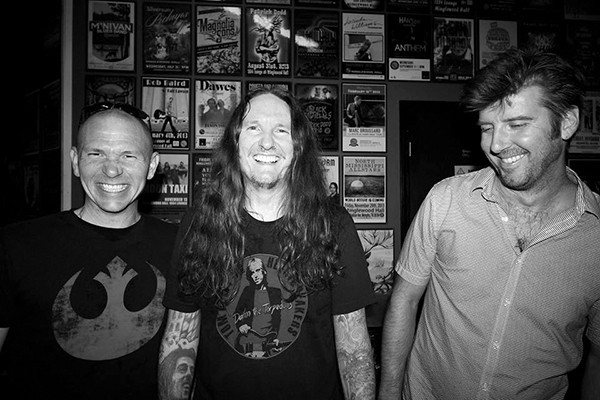Joey Killingsworth’s band, Joecephus and the George Jonestown Massacre, has built up a good bit of name recognition over the 13 years they’ve played and recorded music. The only problem is, this Memphis band has very little place recognition. “We tried to play Minglewood a long time ago,” he recalls, “and the dude’s like ‘I’m sorry, we’ve gotta have a local band for this spot.’ I’ve been playing around here since 1993! And in Memphis band listings, most times, they don’t even spell the name right. But outta town, the name’s spelled right. It’s cool to say you’re from Memphis, but this is a fickle town.”
It’s ironic, because the family name is about as Memphis as you can get. Killingsworth’s father, Bobby Joe, was born in McNairy County and grew up playing rockabilly and country there, until he aimed for the big time and moved to Memphis in 1962. Not long after that, he joined rockabilly/country singer Eddie Bond’s band in a musical partnership that would last for decades. When Bond began hosting a variety show on WHBQ in 1966, his friend Bobby Joe was right there with him, taking on the nickname “Bo Jack” and a new comedic character to boot. The show was on the air for 10 years, and then another five when it was revived in the 1990s.
But Killingsworth the Younger had no taste for country music during most of those years, and invitations from his father to join the Bond band went unheeded. Later, the son grew to appreciate the genres of his father, and even drummed for Bond in the last years of his career. By that time, he was kicking himself for missing out. “Eddie Bond would tell me, ‘You could have met Ernest Tubb! He was on our show.'”
 John Pickle
John Pickle
and Brian Costner
It was also country that gave Killingsworth his first break in the music business. Reluctant to trade on his father’s or Eddie Bond’s name, he created Joecephus and the George Jonestown Massacre as an umbrella group for the diverse music he preferred. Though he grew up on bands ranging from Black Flag to Bauhaus to Nazareth, his newfound love of country led to some radio play in the 2000s.
“I got a bad job review, so I wrote a song about my boss,” says Killingsworth. “That one little song, ‘Quittin Time,’ still gets maybe a couple thousand plays a week. I recorded it by just plugging a guitar and pedals right into the board, and I cringe whenever I hear it, but it outsells everything we’ve ever done. I just went off on my boss and everybody just started requesting it. Rock 103, the morning show, played it for about seven weeks in a row when it came out.”
Momentum grew for the Massacre, and most of the growth was out of town. “I’d search the internet and email any bigger bands playing within an eight-hour radius, to get on board opening for them. You can book one show with David Allan Coe or somebody like that, and then there’s automatically 700 or more people you’re playing for. Then you book your little shows around it.”
The band quickly built on two seemingly contradictory strengths: outlaw country and thrashing riff rock. This eclecticism has served them well. “With the Massacre thing, we’ve been able to play with everybody from Coe to George Lynch (of Dokken), Bad Brains, Johnny Winters, Jim Dickinson. A weird mix of people. We’ve got like 80 songs. We can make it fit into a set.”
The group has parlayed these diverse pairings into some equally diverse collaborations, especially on tribute albums that Killingsworth has masterminded. Perhaps the most popular has been a double LP tribute to Black Oak Arkansas, which blends contributions from the Massacre and original members of Black Oak (including Jim Dandy) with offerings from the likes of Jello Biafra (Dead Kennedys) and Greg Ginn (Black Flag). Killingsworth says it’s not surprising that such pioneers of punk appreciate the Arkansas rockers.
But nowadays, Killingsworth is most excited about the latest release by the Massacre, Death Rattle Shake. This new outing finds them in full riff rock mode, with crunching guitars underpinning Killingsworth’s deadpan vocals. It’s a sound that’s won fans throughout the region, and it’s keeping Joecephus mighty busy — even if, as he notes, “my dad still plays more than I do.”